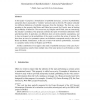Free Online Productivity Tools
i2Speak
i2Symbol
i2OCR
iTex2Img
iWeb2Print
iWeb2Shot
i2Type
iPdf2Split
iPdf2Merge
i2Bopomofo
i2Arabic
i2Style
i2Image
i2PDF
iLatex2Rtf
Sci2ools
IFIP
2005
Springer
2005
Springer
Probable Innocence Revisited
In this paper we propose a formalization of probable innocence, a notion of probabilistic anonymity that is associated to “realistic” protocols such as Crowds. We analyze critically two different definitions of probable innocence from the literature. The first one, corresponding to the property that Reiter and Rubin have proved for Crowds, aims at limiting the probability of detection. The second one, by Halpern and O’Neill, aims at constraining the attacker’s confidence. Our proposal combines the spirit of both these definitions while generalizing them. In particular, our definition does not need symmetry assumptions, and it does not depend on the probabilities of the users to perform the action of interest. We show that, in case of a symmetric system, our definition corresponds exactly to the one of Reiter and Rubin. Furthermore, in the case of users with uniform probabilities, it amounts to a property similar to that of Halpern and O’Neill. Another contribution of o...
Related Content
| Added | 27 Jun 2010 |
| Updated | 27 Jun 2010 |
| Type | Conference |
| Year | 2005 |
| Where | IFIP |
| Authors | Konstantinos Chatzikokolakis, Catuscia Palamidessi |
Comments (0)

